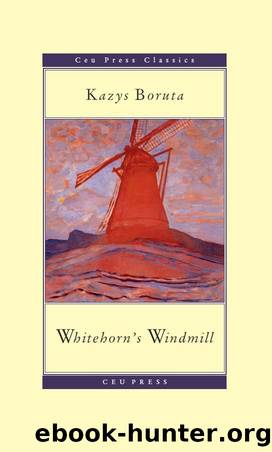Whitehorn's windmill (Ceu Press Classics Book 12) by Boruta Kazys

Author:Boruta, Kazys [Boruta, Kazys]
Language: eng
Format: epub
Publisher: Central European University Press
Published: 2011-09-12T16:00:00+00:00
Afterword
K azys Boruta (1905–1965), the author of Whitehorn’s Windmill (Baltaragio malūnas in the original), was fated to live under an evil star; large stretches of his life were spent either in exile or in prison, beginning as a ten-year-old in 1915, when his parents fled Lithuania to escape the encroachments of World War I. Born during the era of Czarist domination over Lithuania, Boruta fared no better during Lithuania’s period of independence between the wars, as his leftist leanings brought him arrest, imprisonment, exile, and a ban on his work. However, the Soviet takeover of Lithuania after the Molotov–Ribbentrop Pact quickly proved a disappointment; when the Soviets returned after driving the Germans out of Lithuania, Boruta was arrested yet again and spent three years in prison. He remained under a cloud for quite some time after his release, and his work for the next ten years consisted mostly of translations published under a pseudonym.
Whitehorn’s Windmill, most of it written over a sixweek period in early 1942 during the German occupation, has become a classic of Lithuanian literature. It has been adapted into a play (1957), a ballet (1979), and a musical film (1975), as well as printed in numerous editions. On one level it appears to fit into the category of juvenile literature, but like all first-rate literature, its appeal is universal. Written in a lyrical style that gives full rein to the oral folktale tradition Lithuania is famous for, it is by turns romantic, farcical, fantastic, and tragic. Taken in a larger context, the free mixing of fairytale elements with reality, along with the sense of powerlessness in the hands of fate that pervades the work, can easily be interpreted as early magic realism or colonial angst.
The sense of spirituality that permeates the work reflects Lithuania’s pagan roots, roots that were overlaid with an occasionally over-zealous Catholicism not so very long ago. That pagan imagery is deeply embedded: it is completely fitting within this cosmology that Whitehorn should turn into a rock; that horses speak; that a devil is Whitehorn’s nearest neighbor; and that Anupras Hearall, the prototypical wise old man, or in Lithuanian pagan cosmology, the raganius, should own a magic tobacco horn and understand the language of animals. Even Perkūnas, Lithuanian’s ancient pagan god of thunder, plays a part. At one point, Anupras expresses a particular oneness with the universe: “I’m old, and whatever I look at, everything catches my eye, everything gladdens my heart, even that rock by the side of the road.” Whitehorn, when warned by his neighbor Blackpool that he should put up a lightning rod, protests that it’s not needed. Boruta explains: “… lightning was no enemy to him, but one of his own, like all of nature.” The concept of the devil as a prankster who can nevertheless sometimes be out-witted also hearkens back to these pagan beliefs. The name Pinčukas is itself an ancient pagan name for a devil.
Boruta, crafting his tale from the fabric of folktales that every Lithuanian is
Download
This site does not store any files on its server. We only index and link to content provided by other sites. Please contact the content providers to delete copyright contents if any and email us, we'll remove relevant links or contents immediately.
| African American | Asian American |
| Classics | Anthologies |
| Drama | Hispanic |
| Humor | Native American |
| Poetry | Southern |
Crazy Rich Asians by Kevin Kwan(9268)
How to Bang a Billionaire by Alexis Hall(8133)
Giovanni's Room by James Baldwin(7313)
Win Bigly by Scott Adams(7179)
Little Fires Everywhere by Celeste Ng(7174)
Pachinko by Min Jin Lee(5676)
Tease (Temptation Series Book 4) by Ella Frank(5623)
The Fire Next Time by James Baldwin(5421)
The Perks of Being a Wallflower by Stephen Chbosky(4632)
China Rich Girlfriend by Kwan Kevin(4551)
Bluets by Maggie Nelson(4541)
First Position by Melissa Brayden(4515)
The Sympathizer by Viet Thanh Nguyen(4381)
Rich People Problems by Kevin Kwan(4277)
A Little Life (2015) by Hanya Yanagihara(4273)
Right Here, Right Now by Georgia Beers(4194)
Walking by Henry David Thoreau(3946)
Catherine Anderson - Comanche 03 by Indigo Blue(3614)
The Death of the Heart by Elizabeth Bowen(3599)
